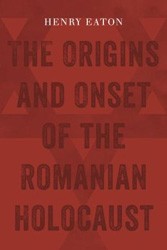This is an appalling, yet fascinating book commissioned by an Israeli institution, but authored by a Romanian cultural anthropologist who specializes in “ethnic imagology,” the study of how diverse ethnic groups imagine outsiders or strangers, even if they have dwelled in the same country for centuries. The focus is on the generally negative and hostile stereotypes about Jews in the various regions of Romania and other Central-East European lands. The breadth of sources and cultural evidence cited is impressive, extending from surveys of historical chronicles and anthropological research, to folk stories, songs, superstitions, and fiction in Romania and neighboring countries.
The evidence cited extends back to early Christian history and up to the present. It is distressing to note how medieval anti-Jewish myths, like the blood libel and the libel of well-poisoning, have stubbornly survived into the present day among some major segments of Romanian and other Central and Eastern European societies. Anyone interested in the serious study of stereotyping and prejudice in the European context should read this book, although it is marred by careless proofreading that overlooked numerous errors in syntax, grammar, and spelling. While sources are cited in extensive notes, the book lacks a bibliography. Index, notes.




